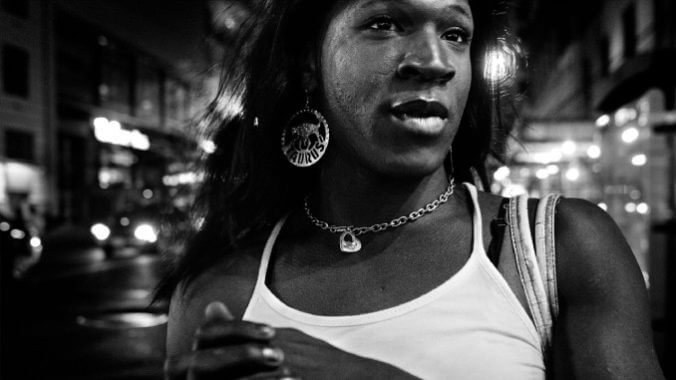The Stroll Electrically Merges Trans History and Trans Present

Though it may not be marketed as such, Zackary Drucker and Kristen Lovell’s new documentary The Stroll is a ghost story. As we walk with Kristen and her fellow former sex workers along what they used to call “The Stroll”—their little section of 14th Street in New York City’s meatpacking district where transwomen once lived, worked and formed a community—the spirits of the past emerge from the margins. Lowell escorts us through the early 1980s until the early 2000s when The Stroll was most active, charging the now gentrified space with psychic residue from the lives and deaths that were paved over to make it possible.
The Stroll is a staggering work of conjuration. Lovell, her friends, and her interviewees unpack the history of the place and all the vibrant spirits who once teemed in the street. These few city blocks become a microcosm that reflects the macrocosm of American transgender history. The women of color who worked on these corners were the same women fighting for gay liberation even when the movement turned their backs. We encounter icons like Sylvia Rivera, and the encampment she set up for other homeless queer people, much later in life. We meet women whose names we might not know or women like Ceyenne Doroshow, whose names we’d better learn to know. Drucker and Lovell expertly weave all these energies of sisters past and present so that we cannot unsee their specters as we walk down the street.
Herself once the subject of a documentary, Lovell is keen to let everyone in The Stroll feel in control of their story. For a long time, most documentaries about trans lives were spiritually dishonest because it was usually an outsider coming in with an agenda. But with this film, Lovell joins the impressive collection of transgender history films like Kokomo City, which give trans women—trans sex workers in particular—access to show and tell their own stories. This not only makes the documentary more honest but also more interesting.
This is a documentary that acknowledges the traumas and dangers of sex work while dedicating more time to the necessities of sex work, the risks and rewards, and the bond that transwomen form by seeing themselves as both family and coworkers. That bond became the bulwark of survival as New York endured the AIDS crisis, 9/11 and the Guliani/Bloomberg administrations, whose policies dramatically increased transwomen’s criminality. All too often, their linked arms served as a raft, helping them stay alive on the streets or in prison. Not even the mainstream gay liberation movement would throw them a lifeline unless there was a profit to be made.
-

-

-

-

-

-

-

-

-

-

-

-

-

-

-

-

-

-

-

-

-

-

-

-

-

-

-

-

-

-

-

-

-

-

-

-

-

-

-

-








































